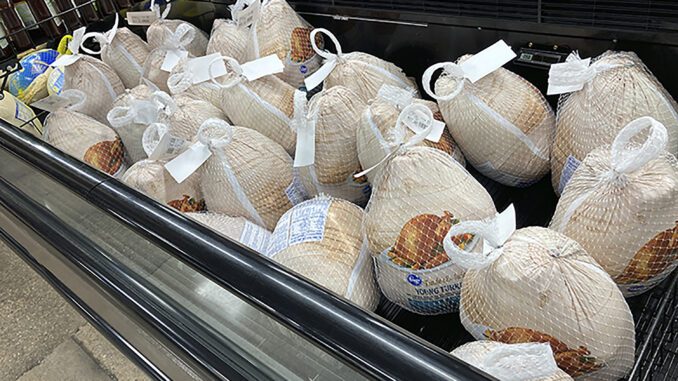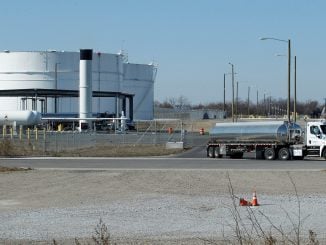
RALEIGH — On Nov. 19, the N.C. Farm Bureau posted on their social media that the estimated cost of Thanksgiving for a party of 10 would be $53.31, a 14% increase from 2020. The data came from an annual analysis done by their parent organization, the American Farm Bureau Federation. John Hott, a turkey-processing plant manager for Prestage Farms, said the price increases are due, in large part, to shortages in both labor and materials.
In order to process the turkey, plants like the one Hott manages in St. Pauls, North Carolina, need certain plastics for packaging, as well as CO2. But these, and other crucial materials, are in short supply and have increased steeply in price.
“The folks that supply our packaging materials, like plastic for whole birds or films that go over our tray-packed ground-turkey products or tray-packed parts, we’ve seen an increase in that pricing,” said Hott. “So I would say plastics, and those types of parts, we’ve seen a price increase of anywhere from 12 to 16%.”
He said there is such a shortage that the suppliers have put all the plants on a strict rationing system called “allocations.” If Prestage has a larger-than-usual order come in, the plastic suppliers will not adjust the plastic order to match that need. This has left many plants with turkey, but no people or packaging to turn it into a finished product.
“Another thing that we just take for granted, because it’s just part of our processing, is CO2,” Hott said. “We saw not only shortages, which have hampered our business a little bit, but price increases on CO2. Every component that we’ve used to run our operation this year, we’ve seen price increases.”
The “main issue” that is causing this, Hott said, is the overall labor shortage. A lack of available workers is causing his suppliers to have to cut production, and in order to attract workers, they are “also having to pay people more,” which gets passed on in the cost of materials he has to buy.
“We had the time in the summer, and then going into the early fall, where there were some employment benefits, and folks weren’t going back to work,” Hott said. “And I think now it’s just huge competition for labor and you see it everywhere.”
He said that his processing plant has been able to find enough workers to get by, but his competitors have largely not. Hott said they met all their orders this year, but they were an industry exception, shipping 200 truckloads of 3,000 hens each this Thanksgiving fresh season.
“I know for a fact that [competitors] cut back their turkey production 30% because of labor. And we’ve seen the effects of that because we’ve had people calling us trying to order products from us. Under normal years, that’d be a good thing. But we’re out of turkey. When I hear of turkey shortages for Thanksgiving, I believe it.”
He said there are a lot of former customers, who had become clients of the bigger companies, who have been calling desperate for whatever they might have left.
“Where we’ve been able to [fill the excess demand], we have, but we’ve had to turn away a lot more than we’ve been able to take on,” Hott said. “We’re mainly a hen plant here, and you’re looking at 84 days to grow a light hen, which would be in that 14-pound range. So you can’t just snap your fingers…”
Hott added: “My advice to anybody would be to go out there and get your turkey as soon as possible.”
While he believes it will be difficult for a lot of people to find a turkey this year, he suggests buying a bigger bird. In years past, about 60% of Thanksgiving turkey sales were for small 12- to 16-pound turkeys and 40% were for larger birds. But, possibly because of COVID decreasing the size of the average holiday gathering, this gap has widened.
“It seems like from what we’ve seen, that shift has gone to like 80-20,” Hott said. “So if you wait to go to the store, you might find a turkey, but it’s going to be one of those bigger birds that will feed you leftovers for weeks.”


